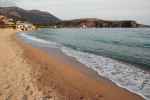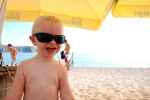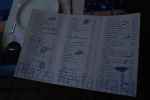
Himarë / Himara is probably the biggest (with its three thounsand inhabitants) of a few small towns situated one next to the other along the coastline, not far behind the Llogara Pass. On the way from Vlora to Saranda, once we have covered hairpin roads and came across Palasë, Dhërmi, Ilias and Vuno we arrive at our destination, Himara, in the Albanian Riviera, by the Ionian Sea, at the feet of Lungarë Mountains.
ATTENTION! Everyone who visited Albania or is planning to go there soon is kindly invited to contribute to this guide. Any inquires regarding this matter should be referred to the editor's address redakcja@libertas.pl.
Himara was founded by the ancient Greek tribe of Chaonians, as Chimaira (from Greek: Χίμαιρα). One of the theories states that the name originated from the Greek word χείμαρρος (cheimarros), which – as I find out from my Greek textbook – means flowing swiftly, ruffled, in full spate. The settlement was initially the part of the Kingdom of Epirus and in 2nd century BC it was incorporated into the expanding Roman Empire and after its collapse into the Byzantine Empire. In the 14th century, when Epirus became the part of the Ottoman Empire, Himara was fighting the invaders for a long time, becoming the symbol of resistance against the Turks. It joined the 1481 uprising led by Gjon Kastrioti – the son of Skanderbeg.
In October 1912 the First Balkan War broke out. Serbia, Greece, Montenegro and Bulgaria united against the Ottoman Empire. Successful Greek army reached as far as Himara in February 1913. At the same time the independent Albania was being created, with Northern Epirus as the bone of contention between the two countries. In December, under the provisions of the Protocol of Florence Himara was included into the Albanian borders, but the Greek inhabiting the region were not satisfied with such state of affairs. The Protocol of Corfu, signed on 17th May 1914 guaranteed big autonomy to the region, allowing to run Greek schools and granting Greeks equal rights. However, the document never came into effect, because, as we all well remember, as early as on 28th June 1914 Archduke Franz Ferdinand got assassinated in Sarajevo, that led to the series of events that eventually resulted in the outbreak of World War I. Shortly after, Himara was taken by Italians and was given back to Albania as late as in 1920, just to be taken under Italian occupation again in 1939. This time, Italians were defeated by Greeks, and subsequently Himara was for a short time a part of Greece, but only until the German invasion in 1941. Himara was finally returned to Albania after World War I.

As already mentioned before, Himara is situated on the main route from Vlora, leading through the Llogara Pass to Saranda and further to Greece. For this reason, there are buses and minibuses running regularly. From here, we may return to Vlora or travel ahead in the direction of Saranda. In the morning there is also a bus running directly to Athens. Precise departure times may change by the year, so the best solution is to obtain information from the locals. They will surely help very eagerly.


The beaches in Himara are quite narrow, gravelly - here and there even rocky, but off season (that is, in September) they are practically deserted, clean and pleasant. The weather is beautiful, actually guaranteed, the temperature of the air and water just perfect and the prices definitely lower than in July and August. Staying nearby, it is worth taking even a one-day break for sunbathing. If we have a car we can also search for some unpopulated beach in the neighbouring areas.
From time to time on the beach there strolls a man with a little child in a baby carrier. Some boys keep throwing each other to the water and take off each other’s underpants for a laugh. Two women lying nearby ask us where we are from. It turns out that the daughter of one of them studies in Cracow, at the Jagiellonian University. After a very nice conversation, from which we get to know that they belong to the Greek minority, they give us a few bunches of grapes and say goodbye with a smile.



We stopped literally in the first hotel we saw – Kaonia Hotel. It is possible that searching further we would find a cheaper one, but our laziness and holiday “don’t-give-a-monkey-ism” turned out to be stronger than the wish to save a few medications. As many other Albanian hotels, painted green Kaonia looks as if it was not finished, the highest storey is still waiting for its walls and it is by no means sure it is to be the last one. The owners, however, are very kind, the rooms are clean and pleasant and there is a beautiful view of the bay from the balcony. Besides, the hotel is so close to the sea that one can easily throw a pair of wet swimming trunks far enough to reach the beach.
In 2009, the room with a view of the sea in Kaonia costed 3000L, the room with the view of the other side - 2500L. Both big enough to house a family of four persons.




Along the road there stretches a series of tables belonging to all kinds of restaurateurs, so we will not die of hunger either. In Himara we have eaten the tastiest börek in our whole journey through Albania, so if you are here you simple must try it!
In Albania some works are visible at every turn. New roads, street lightning, newly-built hotels… It is performed in a slightly different manner than in the western countries, in my opinion a bit more spontaneously, with smaller supervision, at times by fits and starts, as the current means allow, but the pace is really impressive. By the year, the same beaches, roads, hotels and cities may look completely different. I hope they will not come to resemble western Europe too much, as then Albania will lose much of its unique atmosphere. Maybe it is unavoidable – but yet the more you need to hurry to see this interesting Albania!
Albanians are hospitable, helpful and kind. Throughout our whole journey I have never seen a drunk or aggressive Albanian. Supposedly, along with the increasing number of tourists the attitude of the locals is changing, they are getting less hospitable and more profit-oriented. I cannot say anything about it myself as I do not have any opinion on the past situation. Undoubtedly, in 2009 they were more smiling and hospitable than we are on normal basis. And they do have sense of humour, as can be guessed from an English notice on the beach calling for cleanness (KEEP THE BEACH CLEAN). The notice is funny as foreign tourists usually bring their good manners along and they are probably not the ones to litter. It can be read as the manifestation of Albanian sense of humour, or as a praiseworthy method of teaching foreign languages, including English.
Na tematy związane z artykułem można porozmawiać na forum w wątku Albania.